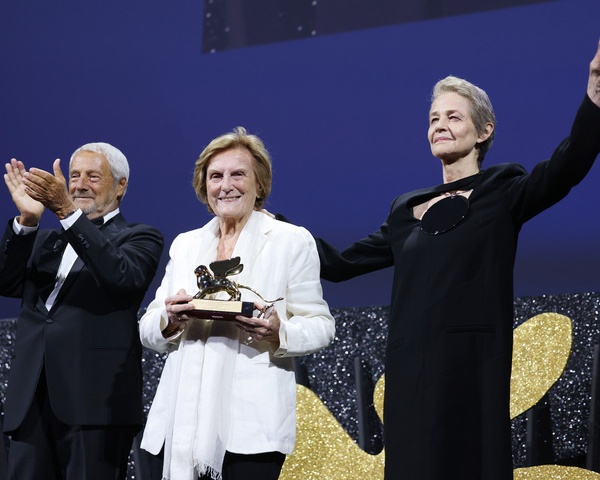Berlin has disgraced itself as both a festival and a host city. The trouble started months before the festival began, as it was announced last summer that Artistic Director Carlo Chatrian — who helped steer the world’s largest festival through the pandemic, and worked to maintain a measure of glitz and glamor while also displaying a curatorial precision that’s unheard of for an event of this size — would not be invited to return for the 2025 edition as part of a cost-cutting measure instituted by the German government.
That news anticipated a festival that would repeatedly fail to reconcile the realities of art and politics — or to even acknowledge its responsibility to try — at a time when pretending as if those two forces can be siloed away from each other feels delusional on its face (bonus irony: The Berlinale was first proposed by an American officer who felt an international film festival in Germany would be a useful foothold during the Cold War).
All parties of Berlin’s state legislature are invited to be publicly financed in Germany, and yet it wasn’t until more than 200 film professionals signed an open letter protesting the decision to welcome members of the far-right Alternative for Germany party that the festival reversed course against a fascistic presence, stating that “People — including elected representatives — who act contrary to our fundamental values are not welcome at the Berlinale.” The decision was met with a mixed response, as the victory against normalizing such hatred was tempered by those who felt that denying our current reality wouldn’t do anything to change it.
The wisdom of that message was on full display by the time the festival came to an end. After repeated calls for a ceasefire in Gaza were made during the closing ceremony (including an impassioned speech by Israeli director Yuval Abraham, whose award-winning “No Other Land” offers a raw and enraging glimpse at the Apartheid conditions that anticipated the current genocide against the people of Palestine), someone hacked the Instagram account of the Berlinale’s Panorama section and used it to post messages accusing Germany of being complicit in the current war.
The Berlinale deleted the posts and released a statement saying that it was going to “file criminal charges against unknown persons,” but that wasn’t enough for the Governing Mayor of Berlin, who tweeted that the hackers’ posts were anti-Semitic, placed full responsibility for the mass slaughter in Gaza on the shoulders of Hamas, and wrote that he expects “the new management of the Berlinale to ensure that such incidents do not happen again.” Good luck with that.
Today, the festival’s Executive Director Mariëtte Rissenbeek — who was hired with Chatrian, and will be leaving along with him — made things even worse by issuing a bizarre statement that suggested the Berlinale would have been OK with the political speeches at the closing ceremony if more (or any?) of the winners had espoused Zionist points of view: “It would have been appropriate in terms of content if the award winners and guests at the Award Ceremony had also made more differentiated statements on this issue,” she said. The festival’s eagerness not to pick sides makes it perfectly clear that it has done just that.
Sadly overshadowed by the furor: That “Dahomey” director Mati Diop, the first Black filmmaker to ever win the Golden Bear, walked away with the festival’s highest honor, and for a documentary about the relationship between a country and its culture.
In the spirit of “Dahomey,” which MUBI acquired before its big win, the best thing that can be said about this year’s Berlinale is that some of the most notable premieres helped illustrate the moral disconnect between the festival and the films it exists to birth into the world. To that end, perhaps the only way to redeem this year’s edition is to make good on that function and do whatever we can to ensure that the festival’s most urgent films are seen by a global audience.
IndieWire had a limited footprint at Berlin this year and only covered a small handful of the 200-plus features that premiered there, so our memo to distributors only scratches the surface of a lineup that was likely replete with buried treasure, but we still found a number of films that deserve American distribution. In the case of “No Other Land,” they demand it as soon as possible.
David Opie, Rachel Pronger, and Josh Slater-Williams also contributed.
-
“All Shall Be Well” (dir. Ray Yeung)

Image Credit: Films Boutique Set in Hong Kong, this deeply moving fourth feature from writer-director Ray Yeung (“Front Cover,” “Cut Sleeve Boys”) tenderly explores the aftermath of unexpected loss, where the uncertainty and chaos of the immediate grieving period is compounded by delicate negotiations that need addressing amid a very specific set of circumstances. Both in their late sixties, Angie (Patra Au Ga Man) and Pat (Maggie Li Lin Lin) are a lesbian couple who’ve been together for over four decades but have never been able to marry in a country that bars same-sex couples from that basic human right. When Pat dies in her sleep, Angie’s life threatens to become a waking nightmare.
Beautifully written and performed, “All Shall Be Well” illustrates Yeung’s keen eye for the nuances of social dynamics, especially regarding matters of wealth and class that many may prefer to skirt around when it comes to family. Much of the low-key film’s power lies in making every key player’s reasoning sympathetic, even when their words or choices are ultimately antagonistic towards the woman left in limbo by the law and fate. As Pat says in the film’s prologue, “Sharing with family isn’t wasting.” But as Yeung’s sensitive, intelligent drama so lucidly demonstrates, it can be far from easy. —JSW
-
“La Cocina” (dir. Alonso Ruizpalacios)

Image Credit: Filmadora If “the kitchen as war zone” has become a veritable sub-genre unto itself, Alonso Ruizpalacios’ “La Cocina” — modernized from a 1957 Arnold Wekser play — is the closest thing it has to its own “Gallipoli.” The trenches are made out of stainless steel instead of rotten wood, and the steady bombardment of orders comes with a greater threat of deportation than it does that of immediate death, but a job at The Grill just outside of Times Square is no less dehumanizing than a deployment along the frontlines at Suvla Bay, and it comes without any of the same hope for glory.
Informed by the writer-director’s own experience as a dishwasher and waiter at a London theme cafe, Ruizpalacios’ claustrophobic film kicks things up enough notches that its best sequences can feel like a singular vision of hell, even if they’re meant to be representative of what’s happening behind the scenes at every overpriced eatery in America. While “La Cocina” can’t always shake the polemical stiffness of its source material or the political chokehold of its modernized setting, the film’s agit-prop expressionism allows it to push beyond the boundaries of other stories like it. Raúl Briones is excellent as the most ambitious worker among the movie’s undocumented kitchen staff, and Rooney Mara brings great texture to the role of the white, American-born hostess who’s pregnant with his baby. Mara’s presence should help make this virtuosic drama more appealing to a keen-eyed, mid-level distributor like Sony Pictures Classics or Focus Features, though it’s just as easy to imagine Netflix grabbing the rights for a streaming play.
-
“No Other Land” (dirs. Yuval Abraham, Basel Adra, Hamdan Ballal, Rachel Szor)

Image Credit: Yabayay Media Basel Adra’s first memory is of Israeli soldiers raiding his house and arresting his father, a Palestinian activist who’s been fighting to preserve the small mountain community of Masafer Yatta since long before his son was born. Adra was only five years old at the time, but he can still remember the fear of that violation as if it only happened yesterday.
In part, that’s because it did; raised in an occupied territory under Apartheid conditions, Adra has never known a life that wasn’t under threat of forced removal. But the freshness of his memory can also be attributed to the fact that Adra has never known a life that wasn’t being documented for his own protection. The most dehumanizing episodes of his existence have all been captured on camera by his family and their fellow villagers, the footage preserved and shared in the hopes that the world might witness their suffering and prevail upon Israel to let Palestinians live in peace (“I started filming when we started to end,” Adra intones, perhaps repeating the same words his father said the first time he picked up his own camera). Against all odds, that hope continues to persevere — not only among the survivors of Masafer Yatta, but also in the raw and enraging documentary that Adra has co-directed about Israel’s decades-long attempt to erase them from the earth as completely as it erased them from its maps.
The first major film about the occupation of Palestine since the start of the Israel-Hamas war in October of last year, “No Other Land” naturally assumes a tragic new urgency in light of the fact that at least 29,000 Palestinians — more than 12,000 of them children — have been murdered in their own country since the Israeli and Palestinian collective of filmmakers who made it together began editing their documentary in preparation of its Berlinale debut, but this harrowing and unforgettable portrait of endurance is all the more powerful for its focus on the decades of colonial degradation that paved the way for Israel’s latest and most nakedly genocidal effort to oppress its neighbors. This documentary would be a major boon to any distributor brave enough to acquire it, as I suspect the audience award it won at Berlin is just the first evidence of the impact this film will have wherever it screens.
-
“Small Things Like These” (dir. Tim Mielants)

Image Credit: Artists Equity Produced by and starring the freshly Oscar-nominated Cillian Murphy, Tim Mielants’ “Small Things Like These” made for a surprisingly understated Berlinale opener, but this powerful movie operates like something of a Trojan horse. The story of a coal delivery man in 1985 Ireland who discovers abusive workhouse conditions at an asylum run by the Catholic Church, this is a political allegory disguised as a character study — a reflection on national guilt and moral complicity wrapped inside the experiences of one man, in one small town, standing in for the whole of Ireland and possibly the world. Given the current context, particularly the institutional silence in the face of ongoing atrocities in Gaza, the questions the film raises about the moral implications of speaking out feel as crucial as ever, and Murphy’s subtly gripping performance should ensure the attention that “Small Things Like These” requires to find an audience receptive to its message. —RP
-
“The Visitor” (dir. Bruce LaBruce)

Image Credit: Berlinale Bruce LaBruce never fails to make good on his reputation as one of modern cinema’s most daring artists, but “The Visitor” — a riotously sacrilegious retelling of Pier Paolo Pasolini’s “Teorema” — is among the director’s greatest provocations to date. It begins with a Black Adonis (Bishop Black) emerging from a suitcase on the shores of the River Thames, his bulging muscles covered in a foam-like substance. The titular visitor heads into the city as a vociferously anti-migrant political speech plays over the soundtrack, and soon finds a job working as a servant for an upper-class white family. The first thing he serves them? Piss, shit, and blood. They lick their plates clean.
Following that first debaucherous meal, the Visitor begins to feast on each member of the family in turn, seducing them individually and also through incestuous pairings as The Father (Macklin Kowal) and The Daughter (Ray Filar) especially can’t keep their hands — and various other body parts — away from him. Each unsimulated sex scene is more graphic than the last, yet a divine ecstasy punctuates every thrust and moan as this white conservative family surrenders to Black male sexual potency.
In LaBruce’s hands, the “alien invasion” that conservative MPs have long feared would destroy British values are used instead to liberate the idyllic nuclear family, showing how sexual desire in its rawest state holds the power to transform and redefine who we are on both an individual and societal level. By positioning the Visitor as a racial minority specifically, LaBruce also pushes back against Britain’s colonial past and present while urging us to wrest free of the norms that suppress and oppress our daily lives. Here’s a great movie that Netflix won’t touch; let’s hope a more adventurous streamer, or a theatrical distributor like Strand, jumps at the opportunity instead. —DO




